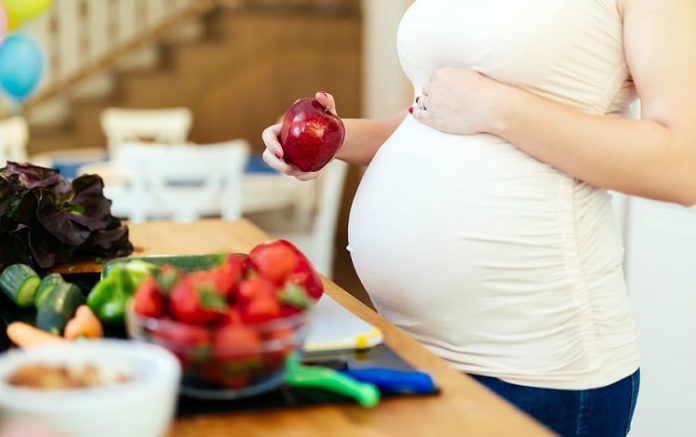How should the pregnant diet be?

Pregnant nutrition is a very important issue in terms of the health of the baby to be born. This issue should be very careful and information should be obtained from experts in the field. The physician who follows the pregnancy will already guide you in the issues he deems necessary according to the results of the analysis. Apart from this, the diet that should be for a healthy, normal pregnant woman is as follows...
How should the pregnant diet be?
Whatever is necessary for the healthy nutrition of normal healthy individuals, the pregnant woman should be fed in the same way. It should be noted here that taking 400 mg of Folic acid without becoming pregnant is useful because it reduces the occurrence of some problems. The pregnant woman needs to take in an additional 300 calories, especially in the second half of pregnancy.
While the total calorie requirement of a normal size adult is around 1800, the need of the pregnant woman is around 2100-2200 calories. Therefore, a diet made without skipping the advice, maintaining the balance between the nutrients is sufficient.
He should not skip three meals and make small snacks between meals. However, the situation to be considered here is that in addition to three meals, 3 snacks should not be made with additional nutrients, in this case, weight gain is inevitable. It should be taken at the snack following that should be separated from the main meals that need to be made by separating a small part that he likes. In this case, calorie control is achieved.
Is weight gain in pregnancy related to pregnancy outcomes?
There is a very close relationship between excess weight gain in pregnancy and the weight of the babies born, and the risk of diabetes, hypertension and heart disease in the later years of children born from such pregnant women increases very much. The occurrence of this condition can be prevented with weight control and regular nutrition during pregnancy. Even the children born to overweight pregnant mothers may be diabetic in later ages. Pregnant nutrition is important for the health of the baby to be born.
Should regular use of vitamins during pregnancy be applied to every pregnant woman?
Unfortunately, there is a craze for vitamin use in pregnant women in our society. This is completely wrong. An adult should use vitamins for health reasons and when it is medically necessary, the same applies to the pregnant. If no medical necessity is detected, it is unnecessary to use it. Apart from this, the use of vitamins in pregnancy on the grounds that the baby will be healthier and smarter is a complete fallacy, a discourse for marketing and sometimes even in cases of missed vitamin use, it can cause serious harm to the baby.
In which cases is the use of iron in pregnancy necessary?
We also see errors in the use of iron in pregnancy. Although the need for iron increases during pregnancy, every normal, healthy mother can already meet this need. Iron deficiency may occur in those who are not in good health and whose iron stores in their body are not sufficient. It is also not a problem for the baby, it only puts the mother in a state of partial anemia. This situation can be corrected by the use of drugs for prevention or treatment. Even if the mother is in this situation, the baby already receives its necessary need from the mother in any case. Pregnancy-specific iron deficiency does not occur before the 22-24th gestational week. Therefore, iron pills can be given 1 time per day in pregnant women whose hemoglobin value is below 11 g by taking a blood count around this period, not because there is anemia, but as a precaution to prevent it from occurring in the following weeks or months. Otherwise, it is not possible for every pregnant woman to use iron routinely and there is no need.
How should the right weight gain be during pregnancy?
The recommended weight gain is 12-14 kilograms. Values other than this should be queried. One of the points to be considered here is between the 12th and 22nd weeks of pregnancy. After loss of appetite and similar minor pregnancy problems in the first 3 months, appetite is opened with a gradual change in hormonal status, the body's control over the appetite center decreases. Even when she takes in excess food and calories, the pregnant woman does not perceive it as excessive. When the appetite center control cannot be achieved, the new eating pattern turns into a habit and in the following weeks the pregnant woman has difficulty in preventing her appetite. If the pregnant woman is informed about this situation in advance, she can manage to have a less problematic pregnancy process by reprogramming herself and providing a conscious diet. The pregnant woman, who goes into labor with controlled and appropriate weight gain, does not have to deal with weight problems much after birth.
What are the differences in nutrition for the expectant mother who has a twin pregnancy?
Twin pregnancies are basically no different from single pregnancies. It does not make a difference in terms of feeding regime. It is useful to check the blood count and iron storage in early gestational weeks and at 22nd and 28th weeks. In twin pregnancies, 20-30 minutes of walking or exercise programs in the morning and evening are very beneficial, as in single pregnancies. It is beneficial in terms of keeping blood circulation and especially leg veins healthy.
How should nutrition be after childbirth?
The pregnant woman should return to the way of feeding in everyday life. Of course, what we are talking about here is a healthy and balanced diet. Feeding breastfeeding mothers with high-calorie foods such as puerperal sorbet and dessert leads to overweight. The nursing mother should be informed about this.
Prof. Dr. Cihat Şen
Gynecology and Obstetrics / Perinatology

Yorum Gönder